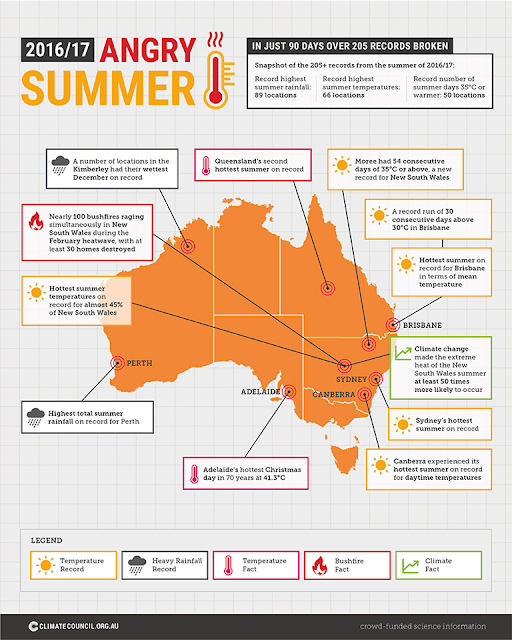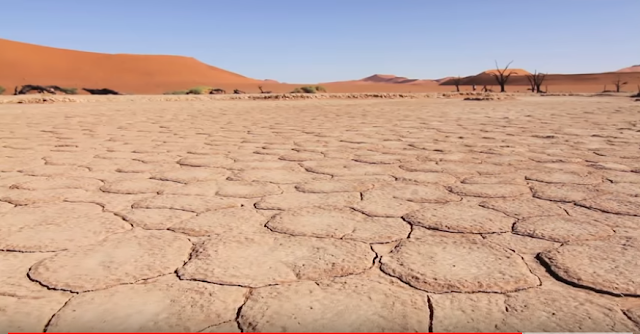"Global warming affects agriculture in a number of ways, including through changes in average temperatures, rainfall, and climate extremes (e.g., heat waves); changes in pests and diseases; changes in atmospheric carbon dioxide and ground-level ozone concentrations; changes in the nutritional quality of some foods; and ..."
1. “What we still don’t have in the year 2019 is a national (Australian) strategy on
climate change in agriculture. There’s still no actual framework to help
farmers manage these risks and implement solutions,” she said. Verity Morgan-Schmidt, the chief executive of Farmers for Climate Action
2. Revitalise, with extra funding, our agricultural support services that have provided excellent research and development in the past, new crops and animal husbandry practices can be developed.
3. Provide education for farmers that demonstrate alternative farming practices, for example move from cattle to goats.
4. Only subsidise farmers that change their practice to accommodate a changing climate and protect our soils but retrain farmers unable to accommodate change.
5. Encourage small farming practices such as permaculture, greenhouse production, urban farms.
Note: Intensive farming practices have been shown to be as productive as industrial broad scale farming.
6. Stop selling water off or subsidising in any way corporations that persist in growing water hungry crops such as cotton and almonds in water scarce areas.
7. Protect our surface and artesian water from destructive and unsustainable industries.
8. Support farmers to plan moves from floodplains or cope with more flooding.
9. Encourage farmers to 'get a yield' with new products.
See also: Preparing for a Climate Change Health Crisis
Climate change and agriculture - Wikipedia
.....................................
 |
| Angry Summer by The Climate Council |
It is obvious that many farmers are going to be displaced because of climate change. As their usual crops become unviable and broad scale farming becomes uneconomical because of costs, it is impossible to continue to subsidise farmers that continue to farm or to graze unsuitable animals in an unsustainable fashion. Yet farmers need government support and Australia requires food production.
 |
| Australia must learn to manage with less surface water. Artesian water resources must be husbanded. |
Suggested Actions
2. Revitalise, with extra funding, our agricultural support services that have provided excellent research and development in the past, new crops and animal husbandry practices can be developed.
3. Provide education for farmers that demonstrate alternative farming practices, for example move from cattle to goats.
4. Only subsidise farmers that change their practice to accommodate a changing climate and protect our soils but retrain farmers unable to accommodate change.
5. Encourage small farming practices such as permaculture, greenhouse production, urban farms.
Note: Intensive farming practices have been shown to be as productive as industrial broad scale farming.
6. Stop selling water off or subsidising in any way corporations that persist in growing water hungry crops such as cotton and almonds in water scarce areas.
7. Protect our surface and artesian water from destructive and unsustainable industries.
8. Support farmers to plan moves from floodplains or cope with more flooding.
 |
| Droughts will occur more often. Soils will erode. Desertification will occur. |
9. Encourage farmers to 'get a yield' with new products.
" 'Agritourism, insect farming off waste resources, bush tucker foods —
there are options out there, but it's not traditional agriculture in
that sense.'
" 'We need support structures, new ideas, people helping us transition to these other production industries. ' "
She (Anika)
believes the first step needs to come from the energy sector to buy
more time for other industries to develop response strategies.
'The
easiest way to put the brakes on what we are experiencing is to
transition away from dirty fossil fuel energy to clean, renewable
energy; that then takes the pressure off other industries.' "
From:Anika Molesworth in ABC's: The future of farming in the era of climate change
An article by Preparations for Climate Change
See also: Preparing for a Climate Change Health Crisis